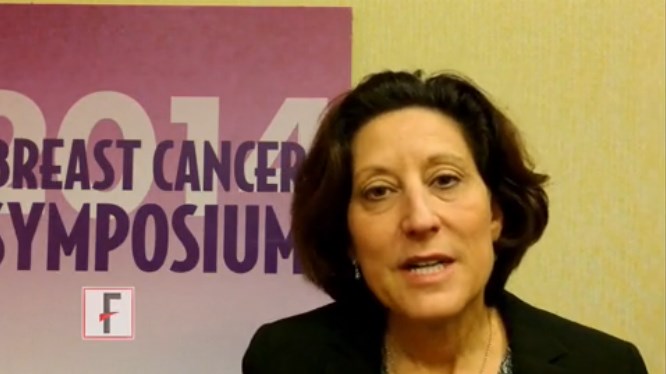User login
SAN FRANCISCO – Can we figure out who doesn’t need excision of atypical ductal hyperplasia and intraepithelial neoplasia? Should we screen all women with low–estrogen receptor positivity (1%-9%) for BRCA mutations? Dr. Hope S. Rugo discusses these questions and others that came up during the final sessions at the breast cancer symposium sponsored by the American Society of Clinical Oncology.
The meeting closed out with discussions of evolving standards in the treatment of breast cancer, how to apply these standards to clinical practice, and talks on reversing hormone resistance, including new agents to improve response to hormone therapy.
Dr. Rugo, director of the Breast Oncology Clinical Trials Program at the University of California, San Francisco, also summarizes data presented in the final presentations, including results from a randomized phase II trial of a GP2 vaccine in the adjuvant setting for high-risk breast cancer patients, suggesting that it may reduce recurrence rates in some women with HER2-positive cancer. “It’s very encouraging because we’ve been sort of barking up the vaccine alley for a long, long time and not gotten anywhere. I think it’s quite encouraging data,” she says.
Dr. Rugo disclosed financial associations with Genomic Health, Plexxikon, Merck, and Novartis. She is on the scientific advisory board of Galena Biopharma, which is developing the breast cancer vaccines.
The video associated with this article is no longer available on this site. Please view all of our videos on the MDedge YouTube channel
On Twitter @sherryboschert
SAN FRANCISCO – Can we figure out who doesn’t need excision of atypical ductal hyperplasia and intraepithelial neoplasia? Should we screen all women with low–estrogen receptor positivity (1%-9%) for BRCA mutations? Dr. Hope S. Rugo discusses these questions and others that came up during the final sessions at the breast cancer symposium sponsored by the American Society of Clinical Oncology.
The meeting closed out with discussions of evolving standards in the treatment of breast cancer, how to apply these standards to clinical practice, and talks on reversing hormone resistance, including new agents to improve response to hormone therapy.
Dr. Rugo, director of the Breast Oncology Clinical Trials Program at the University of California, San Francisco, also summarizes data presented in the final presentations, including results from a randomized phase II trial of a GP2 vaccine in the adjuvant setting for high-risk breast cancer patients, suggesting that it may reduce recurrence rates in some women with HER2-positive cancer. “It’s very encouraging because we’ve been sort of barking up the vaccine alley for a long, long time and not gotten anywhere. I think it’s quite encouraging data,” she says.
Dr. Rugo disclosed financial associations with Genomic Health, Plexxikon, Merck, and Novartis. She is on the scientific advisory board of Galena Biopharma, which is developing the breast cancer vaccines.
The video associated with this article is no longer available on this site. Please view all of our videos on the MDedge YouTube channel
On Twitter @sherryboschert
SAN FRANCISCO – Can we figure out who doesn’t need excision of atypical ductal hyperplasia and intraepithelial neoplasia? Should we screen all women with low–estrogen receptor positivity (1%-9%) for BRCA mutations? Dr. Hope S. Rugo discusses these questions and others that came up during the final sessions at the breast cancer symposium sponsored by the American Society of Clinical Oncology.
The meeting closed out with discussions of evolving standards in the treatment of breast cancer, how to apply these standards to clinical practice, and talks on reversing hormone resistance, including new agents to improve response to hormone therapy.
Dr. Rugo, director of the Breast Oncology Clinical Trials Program at the University of California, San Francisco, also summarizes data presented in the final presentations, including results from a randomized phase II trial of a GP2 vaccine in the adjuvant setting for high-risk breast cancer patients, suggesting that it may reduce recurrence rates in some women with HER2-positive cancer. “It’s very encouraging because we’ve been sort of barking up the vaccine alley for a long, long time and not gotten anywhere. I think it’s quite encouraging data,” she says.
Dr. Rugo disclosed financial associations with Genomic Health, Plexxikon, Merck, and Novartis. She is on the scientific advisory board of Galena Biopharma, which is developing the breast cancer vaccines.
The video associated with this article is no longer available on this site. Please view all of our videos on the MDedge YouTube channel
On Twitter @sherryboschert
AT THE ASCO BREAST CANCER SYMPOSIUM
